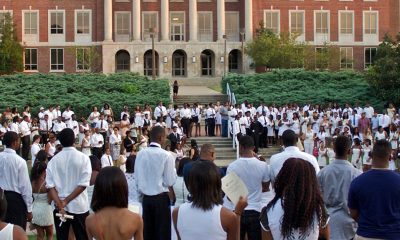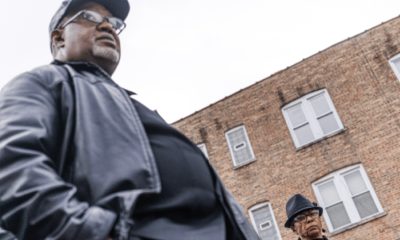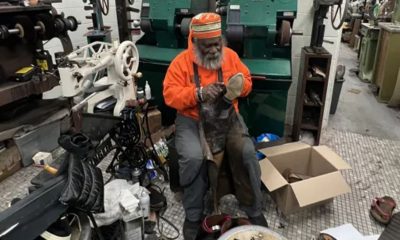Government
Dickson Republican Tell House Committee Cutting COB is Best Practice
THE TENNESSEE TRIBUNE — Representative Mike Curcio repeatedly and mistakenly cited a 2001 National Institute of Justice (NIJ) article.
By Peter White
NASHVILLE, TN — Representative Mike Curcio (R,Dickson) repeatedly and mistakenly cited a 2001 National Institute of Justice (NIJ) article when he spoke last week to the House Subcommittee on Criminal Justice and urged them to cut the heart out of Nashville’s Community Oversight Board.
“The standards bill that you have before you was brought out of observed best practices by
 A graph from a Department of Justice 2018 report, Civilian Oversight of the Police in Major Cities, shows a wide range of COB powers in 41 U.S. cities.
A graph from a Department of Justice 2018 report, Civilian Oversight of the Police in Major Cities, shows a wide range of COB powers in 41 U.S. cities.
the National Institute of Justice that has studied such Community Oversight Boards across the country to find out what makes the boards work best,” Curcio said.
The 167-page NIJ article does not list best practices or even discuss them as such. It examines COBs in several American cities but takes a “no one size fits all” approach. It describes various kinds of COBs, their structures, authority, problems of trust between police and communities and very clearly advises that cities have to decide what works best for them when creating a COB.
Members of the National Association of Civilian Oversight of Law Enforcement (NACOLE) represent 146 jurisdictions. Forty-six of them are also members of the Major Cities Chiefs Association (MCCA).
A 2018 article sponsored by the DOJ’s Office of Community Oriented Policing Services (COPS) surveyed MCCA members about their COBs. They identified three types: investigation-focused model, review-focused model (16), and auditor/monitor model (4). Twelve reported “other” meaning a hybrid or two separate bodies with oversight authority.
Of 41 MCCA agencies, two reported their COBs had all authorities (see graph), while 39 reported limited COB authority. Twenty-six reviewed discipline and independently investigated complaints and 25 heard citizen appeals. Only 4 COBs had the authority to impose discipline.
Half had the power to investigate use of force complaints and to subpoena records. Seventeen of 41 could subpoena witnesses. A July 2017 Gallup Poll found Black respondents’ confidence in law enforcement was only 30 percent, Hispanic respondents’ was 45 percent, and White respondents’ was 61 percent. Clearly race matters and clearly there is no general consensus on what constitutes “best practice” when it comes to COBs. But there is good reason why most Americans favor them.
“A 2016 CATO Institute poll found that 46 percent of Americans (including 64 percent of African Americans) say the police are “generally not” held accountable for misconduct, and 79 percent of Americans support outside law enforcement agencies conducting these investigations,” the report said.
Last November, Nashville voters approved a Metro Charter Amendment establishing a COB by 59 percent to 41 percent. On Tuesday, the Senate Judiciary Committee took up SB 1407, the companion bill to HB 658, approved it, and they will now move to a floor vote in both houses.
Both versions of the bill would block the COB’s ability to independently investigate complaints against police by stripping its power to subpoena witnesses. The bill actually goes further. It disqualifies four COB members who were picked by the City Council from neighborhoods that are considered economically distressed. The bill gives Metro one year to get rid of them. It does not say what will happen if they don’t.
The legislation reads in part: “Prohibits a community oversight board from restricting or otherwise limiting membership based upon demographics, economic status, or employment history.” Oversight Now spokesperson Jackie Sims translates that to mean “no poor black folks need apply”.
“I think they want to get rid of members from communities that are disproportionately impacted by law enforcement. They want to get rid of that so they have what they consider respectable middle-class people on the board,” Sims said.
This article originally appeared in The Tennessee Tribune.
Activism
Oakland Post: Week of April 24 – 30, 2024
The printed Weekly Edition of the Oakland Post: Week of April 24 – 30, 2024

To enlarge your view of this issue, use the slider, magnifying glass icon or full page icon in the lower right corner of the browser window. ![]()
Alameda County
DA Pamela Price Stands by Mom Who Lost Son to Gun Violence in Oakland
Last week, The Post published a photo showing Alameda County District Attorney Pamela Price with Carol Jones, whose son, Patrick DeMarco Scott, was gunned down by an unknown assailant in 2018.

Publisher’s note: Last week, The Post published a photo showing Alameda County District Attorney Pamela Price with Carol Jones, whose son, Patrick DeMarco Scott, was gunned down by an unknown assailant in 2018. The photo was too small for readers to see where the women were and what they were doing. Here we show Price and Jones as they complete a walk in memory of Scott. For more information and to contribute, please contact Carol Jones at 510-978-5517 at morefoundation.help@gmail.com. Courtesy photo.
Bay Area
MAYOR BREED ANNOUNCES $53 MILLION FEDERAL GRANT FOR SAN FRANCISCO’S HOMELESS PROGRAMS
San Francisco, CA – Mayor London N. Breed today announced that the U.S. Department of Housing and Urban Development (HUD) has awarded the city a $53.7 million grant to support efforts to renew and expand critical services and housing for people experiencing homelessness in San Francisco.

FOR IMMEDIATE RELEASE:
Wednesday, January 31, 2024
Contact: Mayor’s Office of Communications, mayorspressoffice@sfgov.org
***PRESS RELEASE***
MAYOR BREED ANNOUNCES $53 MILLION FEDERAL GRANT FOR SAN FRANCISCO’S HOMELESS PROGRAMS
HUD’s Continuum of Care grant will support the City’s range of critical services and programs, including permanent supportive housing, rapid re-housing, and improved access to housing for survivors of domestic violence
San Francisco, CA – Mayor London N. Breed today announced that the U.S. Department of Housing and Urban Development (HUD) has awarded the city a $53.7 million grant to support efforts to renew and expand critical services and housing for people experiencing homelessness in San Francisco.
HUD’s Continuum of Care (CoC) program is designed to support local programs with the goal of ending homelessness for individuals, families, and Transitional Age Youth.
This funding supports the city’s ongoing efforts that have helped more than 15,000 people exit homelessness since 2018 through City programs including direct housing placements and relocation assistance. During that time San Francisco has also increased housing slots by 50%. San Francisco has the most permanent supportive housing of any county in the Bay Area, and the second most slots per capita than any city in the country.
“In San Francisco, we have worked aggressively to increase housing, shelter, and services for people experiencing homelessness, and we are building on these efforts every day,” said Mayor London Breed. “Every day our encampment outreach workers are going out to bring people indoors and our City workers are connecting people to housing and shelter. This support from the federal government is critical and will allow us to serve people in need and address encampments in our neighborhoods.”
The funding towards supporting the renewal projects in San Francisco include financial support for a mix of permanent supportive housing, rapid re-housing, and transitional housing projects. In addition, the CoC award will support Coordinated Entry projects to centralize the City’s various efforts to address homelessness. This includes $2.1 million in funding for the Coordinated Entry system to improve access to housing for youth and survivors of domestic violence.
“This is a good day for San Francisco,” said Shireen McSpadden, executive director of the Department of Homelessness and Supportive Housing. “HUD’s Continuum of Care funding provides vital resources to a diversity of programs and projects that have helped people to stabilize in our community. This funding is a testament to our work and the work of our nonprofit partners.”
The 2024 Continuum of Care Renewal Awards Include:
- $42.2 million for 29 renewal PSH projects that serve chronically homeless, veterans, and youth
- $318,000 for one new PSH project, which will provide 98 affordable homes for low-income seniors in the Richmond District
- $445,00 for one Transitional Housing (TH) project serving youth
- $6.4 million dedicated to four Rapid Rehousing (RRH) projects that serve families, youth, and survivors of domestic violence
- $750,00 for two Homeless Management Information System (HMIS) projects
- $2.1 million for three Coordinated Entry projects that serve families, youth, chronically homeless, and survivors of domestic violence
In addition, the 2023 CoC Planning Grant, now increased to $1,500,000 from $1,250,000, was also approved. Planning grants are submitted non-competitively and may be used to carry out the duties of operating a CoC, such as system evaluation and planning, monitoring, project and system performance improvement, providing trainings, partner collaborations, and conducting the PIT Count.
“We are very appreciative of HUD’s support in fulfilling our funding request for these critically important projects for San Francisco that help so many people trying to exit homelessness,” said Del Seymour, co-chair of the Local Homeless Coordinating Board. “This funding will make a real difference to people seeking services and support in their journey out of homelessness.”
In comparison to last year’s competition, this represents a $770,000 increase in funding, due to a new PSH project that was funded, an increase in some unit type Fair Market Rents (FMRs) and the larger CoC Planning Grant. In a year where more projects had to compete nationally against other communities, this represents a significant increase.
Nationally, HUD awarded nearly $3.16 billion for over 7,000 local homeless housing and service programs including new projects and renewals across the United States.
-

 Community2 weeks ago
Community2 weeks agoFinancial Assistance Bill for Descendants of Enslaved Persons to Help Them Purchase, Own, or Maintain a Home
-

 Activism4 weeks ago
Activism4 weeks agoOakland Post: Week of April 3 – 6, 2024
-

 Business2 weeks ago
Business2 weeks agoV.P. Kamala Harris: Americans With Criminal Records Will Soon Be Eligible for SBA Loans
-

 Community2 weeks ago
Community2 weeks agoAG Bonta Says Oakland School Leaders Should Comply with State Laws to Avoid ‘Disparate Harm’ When Closing or Merging Schools
-

 Activism3 weeks ago
Activism3 weeks agoOakland Post: Week of April 10 – 16, 2024
-

 Community1 week ago
Community1 week agoOakland WNBA Player to be Inducted Into Hall of Fame
-

 Community1 week ago
Community1 week agoRichmond Nonprofit Helps Ex-Felons Get Back on Their Feet
-

 City Government2 weeks ago
City Government2 weeks agoLAO Releases Report on Racial and Ethnic Disparities in California Child Welfare System























































